Index relies entirely on the support of donors and readers to do its work.
Help us keep amplifying censored voices today.
To mark the International Day to End Impunity for Crimes Against Journalists, members of Index on Censorship’s youth board have prepared a video statement outlining a particular case of impunity.
With over 800 journalists and media workers murdered around the world over the past decade, IFEX co-ordinates the global #NoImpunity campaign that aims to bring attention and action to the shocking conviction rate for attacks on media workers. Only one in ten of these crimes ends in punishment.
Read also:
#NoImpunity: Those who attack journalists must be held to account
[vc_row][vc_column][vc_column_text]
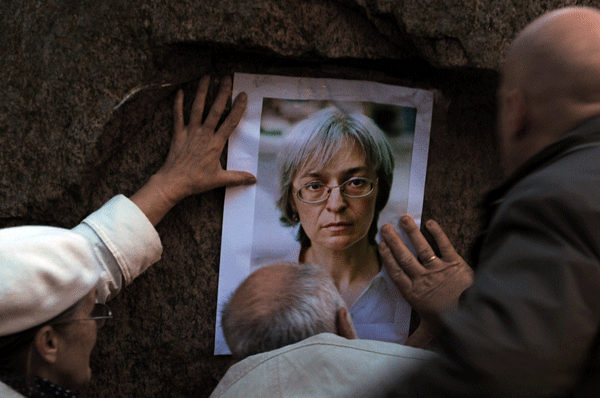
Remembering murdered Russian journalist Anna Politkovskaya
In 2002, the well-known Russian journalist Anna Politkovskaya, was living in Vienna. She had been sent there for her own safety by Dmitry Muratov, editor-in-chief of her newspaper Novaya Gazeta, after she received threats from high-ranking officials over her reports from Chechnya and her criticism of Vladimir Putin’s regime. Her life remained under threat and she was largely confined to her home. She filed this article to Index on Censorship magazine (vol. 31,1) in spring 2002, shortly before she won Index’s Freedom of Expression Award. Four years later in October 2006, she was shot dead in her apartment building after returning to Moscow.
Just before my last trip to Chechnya in mid-September my colleagues at Novaya Gazeta began to receive threats and were told to pass on the message that I shouldn’t go to Chechnya any more. If I did, my life would be in danger. As always, our paper has its ‘own people’ on the general staff and the ministry of defence — people who broadly share our views. We spoke to people at the ministry but, despite their advice, I did go back to Chechnya, only to find myself blockaded in the capital, Grozny. The city was sealed off after a series of strange events. Controls were so tight you couldn’t even move between different districts within the city, let alone make your way out of Grozny on foot. On that day, 17 September, a helicopter carrying a commission headed by Major-General Anatoly Pozdnyakov from the general staff in Moscow was shot down directly over the city. He was engaged in work quite unprecedented for a soldier in Chechnya.
Only an hour before the helicopter was shot down, he told me the task of his commission was to gather data on crimes committed by the military, analyse their findings, put them in some order and submit the information for the president’s consideration. Nothing of the kind had been done before. Their helicopter was shot down almost exactly over the city centre. All the members of the commission perished and, since they were already on their way to Khankala airbase to take a plane back to Moscow, so did all the material they had collected.
That part of the story was published by Novaya Gazeta. Before the 19 September issue was sent to the printers, our chief editor Dmitry Muratov was summoned to the ministry of defence (or so I understand) and asked to explain how on earth such allegations could be made. He gave them an answer, after which the pressure really began. There should be no publication, he was told. Nevertheless, he decided to go ahead, publishing a very truncated version of what I had written.
At that point, the same people at the ministry who had claimed our report was false now conceded it was true. But they began to warn of new threats: they had learned that certain people had run out of patience with my articles. It was, in other words, the same kind of conversation as before my last trip to Chechnya. Then we heard that a particular officer, a Lieutenant Larin, whom I had described in print as a war criminal, was sending letters to the newspaper and similar notes to the ministry. The deaths and torture of several people lie on his conscience and the evidence against him is incontrovertible. Soon there were warnings that I’d better stay at home. Meanwhile, the internal affairs ministry would track down and arrest this self-appointed military hitman, and deputy minister Vasilyev would himself take charge of the operation.
I was supposed to remain at our apartment and go nowhere. But they made no progress in finding Larin, and I began to realise that this was simply another way of forcing me to stop work. The newspaper decided I should leave the country until the editors were sure I could again live a normal life and resume my work.
The paper was forced to omit from my story the sort of detail that is vital to the credibility of an article like this, which suggested the military themselves had downed the helicopter. All my subsequent difficulties began with those details. If these details surface, the ministry of defence warned our chief editor, that’s the end for you . . .
In fact, since I was moving around the city at the time, I can personally testify to what happened, as can others who were there with me. And these were no ordinary citizens: among them were Chechen policemen and Grozny Energy Company employees who, like me, were trapped inside the city. FSB [former KGB] General Platonov was also there. Currently, he is a deputy to Anatoly Chubais, chief executive of United Energy Systems, a key Kremlin player throughout the 1990s and a hawk on Chechnya. All these saw and knew exactly what I know. Platonov is not only Chubais’s deputy but remains a deputy to FSB director Patrushev (in early 2001, the ‘anti- terrorist operation’ in Chechnya was transferred from the military command of the Combined Forces Group to the FSB and its director Patrushevin Moscow placed in overall charge). No one else saw and knew as much about what happened as Platonov — he couldn’t help but see it. Not one person was allowed into the city centre after 9am that morning. And yet a helicopter was downed there.
Different branches of the military are split over future policy in Chechnya. There are good reasons why the recent public statements of defence ministry spokesmen all repeat the same phrases: ‘We deny the possibility of negotiations’; ‘It’s out of the question’; ‘We are just doing our job.’ Indeed they are: their ‘sweep and cleanse’ operations have become even more brutal. Let us suppose that those representing certain other branches of the military on the ground in Chechnya are pursuing a rather different policy. That is where you should seek the reason for the deaths of all the commission members. I’m just a small cog in that machine — someone who happened to be in the thick of events when no other journalists were around.
Those who want to continue fighting seem to have the upper hand; they represent the more powerful section within the so-called CFG, the Combined Forces Group. To avoid repetition of the disastrous lack of coordination between ministries of defence and internal affairs and the FSB during the first Chechen conflict in 1994—96, overall command of army, police and other paramilitary and special units (CFG) in the present war was given to the military. Although the FSB supposedly now exercise overall control of the ‘anti-terrorist operation’, the military are too strong for them. On the fateful day the helicopter was downed and the commission perished, not even servicemen and officers were permitted to enter the central, cordoned-off area of Grozny. Only defence ministry officials were allowed through. Even FSB and ministry of justice people were kept out; that was extraordinary. No one was permitted to enter the area where the helicopter was about to fall: representatives of other military bodies and organisations, even ranking officers, had no right to go there.
I don’t think we should expect too much from the defence ministry, nor from President Putin [in the light of the US-led campaign in Afghanistan. Ed]. He has received carte blanche to take the measures and employ the forces he considers necessary in Chechnya. I’m thinking of Prime Minister Blair’s recent activities and words spoken by Chancellor Schroeder when Putin was visiting Germany. As you know, it was then said that Europe should re-examine its stance on Chechnya.
Their position was already pretty feeble and bore no relation to the real state of affairs in Chechnya and the abuse of human rights there. If, however, they are going t o alter their position, then it’s clear what will happen. I n practical terms they’ll support Putin. Whatever he does will be fine by them. I think he’s been working steadily and persistently towards that end for some time. And I’m sure he’ll make good use of it now. Not for the first time in the present war, there’s been a battle to see whose nerve is stronger. Putin held back [over the West’s ‘anti-terrorist operation’] for some while: we shan’t support the Northern Alliance in Afghanistan, he said, but we’ll offer them back-up. Then he agreed to supply them with arms and, evidently, advisers. In exchange he received a free hand in Chechnya. That’s the way things are likely to go, I’m afraid.
I can’t say when it will happen, but whatever happens there will be a more intensive ‘liquidation of Chechen partisans’. As always in Russia, however, it all depends on the methods to be used. What will the ‘liquidation of Chechen bandits’ amount to this time? Will they herd everyone else into concentration camps or hold repeated sweep operations in all the population centres in Chechnya?
I can’t answer for Chechen President Maskhadov, but will offer a brief analysis of his actions. In my view, he is doing nothing whatsoever. He has retreated into his shell and is thinking, to the exclusion of all else, about his own immediate future — he’s forgotten the Chechen nation. Just as the federal authorities in Moscow have abandoned the Chechens, so now have the other side. The nation has to fend for itself, with no leadership or protection. It survives as best it can. If people need to take revenge for their tortured and murdered relatives, they will. If they need to say nothing, they’ll keep their mouths shut. In such circumstances, which are the equivalent of a civil war, and under continuing pressure from the federal forces, no one today can say whom the Chechen nation would vote for if elections were held. No one now has any idea whom they’d elect and in that respect everyone has committed the same enormous mistake.
Maskhadov has obviously been driven into a corner. But the struggle for independence has become an obsession with him: he will hear of nothing else. I don’t really understand what use independence will be to him, when he, Shamil Basayev and his immediate bodyguard are all that’s left. The first duty of a president is to fight for the well-being of his nation. I have my own president and it makes no difference that I personally did not vote for Putin. He remains the most important figure in the Russian state. And I’d like him to enable me, and everyone else, to live a normal life. I’m referring to the laws that should govern our existence. I find myself in a situation, however, where no one gives a damn how I survive. I’m cut off from my family. I don’t know what will happen in the future to my two children. It is not law that rules Russia today. There’s no person and no organisation to which you can turn and be certain that the laws have any force.
I have no thoughts about my future. And that’s the worst of all. I just want everything to change so I can go back and live in Moscow again. I can’t imagine spending any length of time here. Or in any other place, for that matter. I must do all in my power to return to Moscow. But I have no idea when that will be.
If people in my country have no protection from this lawless regime, that means I survive here while others are dying. Over the last year I’ve been in that position too often. People who were my witnesses and informants in Chechnya have died for that reason, and that reason alone, as soon as I left their homes. If it again proves the case, then how can I go on living abroad while others are dying in my place?
[/vc_column_text][vc_row_inner][vc_column_inner width=”1/2″][vc_single_image image=”78078″ img_size=”full”][/vc_column_inner][vc_column_inner width=”1/2″][vc_column_text]In the autumn 2016 issue of Index on Censorship magazine, Russian journalist Andrey Arkhangelsky reflected on Politkovskaja’s legacy 10 years on, and looks at the state of journalism in the country today. You can get your copy here, or take out a digital subscription from anywhere in the world via Exact Editions (just £18* for the year). Each magazine sale helps Index on Censorship fight for free expression worldwide.
*Will be charged at local exchange rate outside the UK.
Copies will be available at the BFI, the Serpentine Gallery, MagCulture, (London), News from Nowhere (Liverpool), Home (Manchester), Red Line Books (Colchester) and on Amazon. Each magazine sale helps Index on Censorship continue its fight for free expression worldwide.
The full contents page of the magazine can be read here.[/vc_column_text][/vc_column_inner][/vc_row_inner][/vc_column][/vc_row][vc_row][vc_column][vc_basic_grid post_type=”post” max_items=”12″ style=”load-more” items_per_page=”4″ element_width=”6″ grid_id=”vc_gid:1535620669542-cd67c3af-4d46-5″ taxonomies=”1305″][/vc_column][/vc_row]
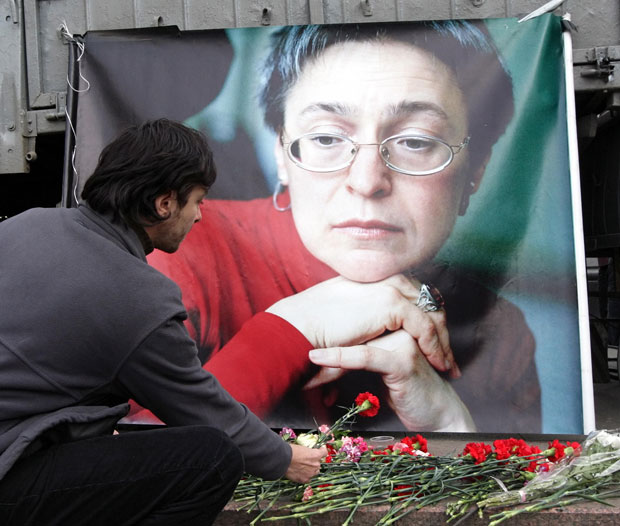
A man lays flowers near the picture of murdered journalist Anna Politkovskaya, during a rally in Moscow, Russia, 7 October 2009. CREDIT: EPA / Alamy Stock Photo
On 7 October 2006 investigative journalist Anna Politkovskaya was shot and killed in her apartment building in Moscow. In the latest issue of Index on Censorship magazine, Russian journalist Andrey Arkhangelsky reflects on Politkovskaya’s legacy 10 years on and looks at the state of journalism in the country today.
Politkovskaya, who worked for newspaper Novaya Gazetta, was known for her investigative reporting, particularly looking into the atrocities committed by Russian armed forces in Chechnya, and her criticism of the Putin administration.
She was a recipient of an Index on Censorship Freedom of Expression Award in 2002.
Ahead of the anniversary of her death, Index has compiled a reading list of articles written for the magazine both by Politkovskaya and about her. The collection also includes articles exploring media freedom in Russia and why the deaths are Russian journalists seem to go unnoticed and uninvestigated.
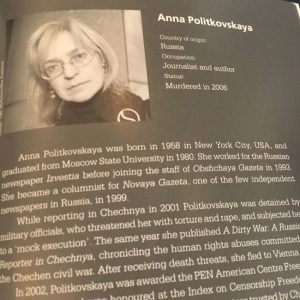
From The Cadet Affair: the Disappeared; an extract, written by Anna Politkovskaya, was published in the winter 2010 issue of Index on Censorship magazine
From The Cadet Affair: the Disappeared
December 2010; vol. 39, 4: pp. 209-210.
In 2010 Index published this extract from Nothing But the Truth: Selected Dispatches, a collection of Politkovskaya’s best writings. In this piece, she writes about the disappeared in Chechnya.
January 2002; vol. 31, 1: pp. 30-34.
An interview with Politkovskaya who, at the time of publication, was living in Vienna, having been sent there for her own safety by Dmitry Muratov, editor-in-chief of Noveya Gazetta, after receiving threats from high-ranking officials who had been annoyed by her reports from Chechnya.
March 2012; vol. 41, 1: pp. 85-95.
Irena Maryniak considers the hidden network of relationships that continue to shape Russian society, undermine the rule of law and protect the status quo. In this article Maryniak highlights Politkovskaya’s concerns of the effects of the Kremlin’s reach and her work reporting on the atrocities inflicted on the Chechen population by the Russian armed forces and the Russian-backed administration of Akhmad Kadyrov.
November 2009; vol. 38, 4: pp. 44-58.
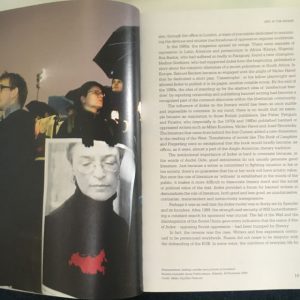
Grit in the engine by Robert McCrum, in the 40 year anniversary issue of Index on Censorship magazine.
Maria Eismont talks to Dmitry Muratov, editor of the newspaper Novaya Gazeta, at which Politkovskaya spent seven years as a journalist, about his struggle for press freedom and justice in Russia.
November 2009; vol. 38, 4: pp. 31-43.
In this article Joel Simon, of the Committee to Protect Journalists, discusses how impunity is an urgent issue facing press freedom campaigners; and, after reflecting on Politkovskaya’s murder, outlines a roadmap for action
February 2008; vol. 37, 1: pp. 26-34.
Edward Lucas explains how during Putin’s presidency media freedom has moved from the imperfect to the moribund, in an adaption from his book The New Cold War: how the Kremlin menaces Russia and the West.
March 2012; vol. 41, 1: pp. 12-20.
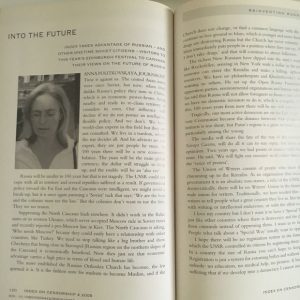
Into the Future; Index interviews Anna Politkovskaya in the winter 2005 issue of Index on Censorship magazine.
Robert McCrum considers Index’s role in the history of the fight for free speech, from the oppression of the Cold War to censorship online; and highlights how Politkovskaya turned to Index for help in making the west understand the dangers Russian journalists face.
November 2005; vol. 34, 4: pp. 120-125.
Index interviews Politkovskaya at the Edinburgh Festival, in which she discusses the future of Russia.
“We lost journalism in Russia”
September 2015; vol. 44, 3: pp. 32-35.
Andrei Aliaksandrau examines the evolution of censorship in Russia, from Soviet institutions to today’s blend of influence and pressure.
December 2010; vol. 39, 4: pp. 17-23.
Carole Seymour-Jones celebrates the achievements of 50 years of fighting for authors’ freedoms and explains why there is so much more work to be done.
You can read Andrey Arkhangelsky’s article by subscribing to the magazine or taking out a digital subscription from anywhere in the world via Exact Editions (just £18* for the year). Each magazine sale helps Index on Censorship fight for free expression worldwide.
*Will be charged at local exchange rate outside the UK.
Magazines are also on sale in bookshops, including at the BFI and MagCulture in London, News from Nowhere in Liverpool and Home in Manchester; as well as on Amazon and iTunes. MagCulture will ship to anywhere in the world.
For the London Press Club’s monthly social evening, Index on Censorship has teamed up with the Frontline Club to present a discussion examining the changing role of the foreign correspondent within a rapidly evolving media landscape.
In the past twenty years budget cuts across the foreign news industry have seen the near-demise of Western foreign correspondents posted abroad. In their place, local-national stringers have become increasingly important providers of foreign news stories. While the nature of conflicts changes and reporting from high-risk zones becomes more dangerous, the traditional model of the foreign correspondent has shifted. The majority of foreign news is no longer gathered by traditional foreign correspondents posted abroad, but by local nationals who were born and raised in the country they report on.
Is the foreign correspondent an endangered species in the news industry? What new models of foreign reporting are emerging alongside new information-gathering technologies? We will be joined by an expert panel to discuss trends in the industry and the future role of the foreign correspondent.
Chair: Rachael Jolley, editor of Index on Censorship magazine.
Speakers:
Kim Sengupta
Defence correspondent at The Independent.
Dr Haider Al Safi
London-based Iraqi journalist and media consultant covering middle eastern politics.
Caroline Lees
Former news and foreign correspondent who has worked as South Asia correspondent for the Sunday Times.
Samira Shackle
London-based freelance journalist who has reported extensively on Pakistan over the last five years
When: 1 November 2016, 7pm
Where: The Frontline Club (map)
Tickets: This is a free ticketed event. Fully booked.